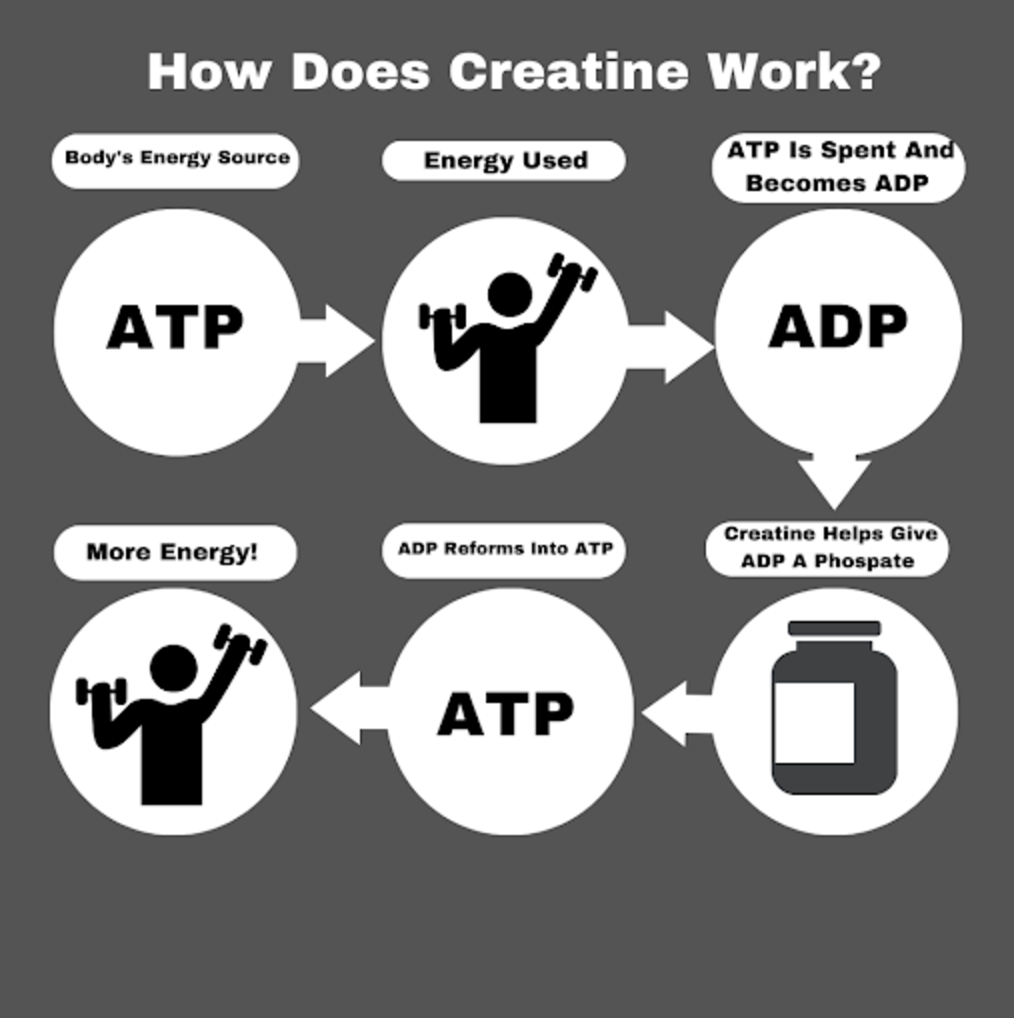What is the deal with Creatine?
What is Creatine?
You may be seeing creatine all over your social media searches (I know I am), and you may feel like you ‘need’ to take it (thank you fancy marketing). Let’s have a look at what creatine is and who may benefit from it.
Creatine is a naturally occurring compound that the body synthesises (can create on its’ own) in small amounts (approximately 1 gram daily) (Kreider et al., 2017).
For omnivores (an animal or person that eats a variety of food of both plant and animal origin), meat and fish are the primary sources of creatine, whereas people who don’t eat meat or fish, typically have lower levels of creatine in the muscle and blood (for obvious reasons as they won’t be eating these foods) (Kreider et al., 2017).
How Does Creatine Work?
Imagine you are Usain Bolt, and you are about to run a 100m sprint. Your body obviously will need a surge of energy to be able to do this. This short, intense sprint requires a specific energy system in our body, the phosphocreatine system (Saoto, et al., 2022). This system, specifically runs on ATP (adenosine triphosphate if you want to be fancy).
ATP is the energy currency we need to have the capacity to run this race.
Once our body uses the energy (ATP), it become ‘inactive’, as ADP. The ADP requires a phosphate ground (chemistry terms here) to become ATP again, woo hoo! This conversion happens naturally, however, this is where our lovely Creatine comes in. Creatine can help to speed up this conversion to give us our ‘energy’ again.
*Note: I’m using the word ‘energy’ a lot here. Try not to think of energy as just being alert and awake (like when you’ve had a coffee), energy in this context means ‘capacity’ as in the ‘capacity’ to do the work. Okay, let’s carry on.
Supplementing with creatine can increase your body's phosphocreatine levels, which can donate a phosphate group to ADP, quickly regenerating ATP to support energy demands.
So why would we consider supplementing?
Although the rate of energy production from muscle creatine is very high, storage capacity is very limited. There is enough creatine in skeletal muscle to support about 8 to 10 seconds of maximal exercise.
So, that leaves us with using creatine as a helper, to active ATP from ADP, and subsequently improve high-intensity exercise performance.
Image from: https://au.pinterest.com/pin/138485757357652263/
What should we use and how much?
Who may benefit from it?
Creatine monohydrate is a white powder that can be ingested after combining it with liquid (e.g. a post-exercise protein-carbohydrate recovery drink) or food (e.g. Greek yogurt). As a note about food safety (because we love food safety), creatine supplements should be ingested immediately following mixing, as in liquid form, creatine quickly degrades to creatinine (AIS, 2017).
The quickest way to "creatine load" is to:
-Take large doses (20-30 g per day) for around 5-7 days. Typically, these doses are split over the day to sustain plasma creatine levels (e.g. 5g, four to five times each day). Eating a large amount of carbohydrate (about 70-100 g) with each dose increases creatine uptake via the stimulatory effects of insulin. Therefore it is useful to take your creatine doses along with a meal or substantial carbohydrate-rich snack.
A 'maintenance' supplemental dose of 2-5 g creatine per day keeps the loaded muscle at elevated levels.
(Some research has suggested that athletes whose levels are initially lowest might respond best to supplementation, i.e. those who don’t eat meat).
NOTE: If supplementation is ceased, muscle creatine stores gradually return to resting levels - some studies have shown that it takes 4-6 weeks for this to occur. Many athletes cycle their creatine supplementation - loading up, maintaining for a certain training period, and then stopping the supplements for a couple of weeks before reloading. This may suit the athlete's training cycle or periodisation. Whether such cyclical use is better than prolonged continual use has not been studied (Sports Dietitians Australia, 2017).
Creatine supplementation improves the performance of brief (usually <30 sec), high-intensity exercise, especially when there are repeated bouts (AIS, 2017).
https://highschool.latimes.com/newport-harbor-high-school/opinion-are-usain-bolts-records-in-danger/
So, this may include:
• Track sprints: 60–200 m
• Swim sprints: 50 m
• Pursuit cycling (mechanism = having increase Phosphocreatine).
• Basketball
• Field hockey
• America Football
• Ice hockey
• Lacrosse
• Volleyball (mechanism = Increased Phosphocreatine Resynthesis).
• Downhill skiing
• Water Sports (e.g., Rowing, Canoeing, Kayaking, Stand-Up Paddling)
• Swim events: 100, 200 m
• Track events: 400, 800 m
• Combat Sports (e.g., MMA, Wrestling, Boxing, etc.) (Mechanism = Reduced Muscle Acidosis = muscles can work harder for longer).
• Basketball
• Soccer
• Team handball
• Tennis
• Interval Training in Endurance Athletes (mechanism = Oxidative Metabolism = the ability to make oxygen)
• Bodybuilding
• Combat Sports (e.g., MMA, Wrestling, Boxing, etc.)
• Powerlifting
• Rugby
• Track/Field events (Shot put; Javelin; Discus; Hammer Throw)
• Olympic Weightlifting (mechanism = Increased Body Mass/Muscle Mass) (Kreider, 2027).
What about water retention?
You may have heard that creatine supplement can cause weight gain (this is generally scale weight gain, rather than fat gain, as creatine may increase water retention.
However, “while there is some evidence to suggest that creatine supplementation increases water retention, primarily attributed to increases in intracellular volume, over the short term, there are several other studies suggesting it does not alter total body water (intra or extracellular) relative to muscle mass over longer periods of time. As a result, creatine supplementation may not lead to water retention” (Antonio, 2021).
Obviously, there may be an individual response, however, if you are not taking creatine because you are worried about ‘weight gain’, this may change your mind.
Want the Summary?
Creatine is a naturally occurring compound that the body synthesises (can create on its’ own) in small amounts (approximately 1 gram daily) (1).
We can get it from meat and fish (or supplementation).
Creatine can increase your body's phosphocreatine levels, which can donate a phosphate group to ADP, quickly regenerating ATP to support energy demands (i.e. it helps us to regenerate ‘energy’ that we need to exercise.
Although the rate of energy production from muscle creatine is very high, storage capacity is very limited. There is enough creatine in skeletal muscle to support about 8 to 10 seconds of maximal exercise.
Sports that would benefit from having adequate creatine levels (food or supplementation) include: powerlifting, some team sports, track sprints, swim sprints and some combat sports.
The quickest way to "creatine load" is to take Creatine monohydrate, in large doses (20-30 g per day) for around 5-7 days (2).
A 'maintenance' supplemental dose of 2-5 g creatine per day keeps the loaded muscle at elevated levels.
There is mixed evidence on whether creatine supplementation causes water retention (i.e. scale weight gain).
1. Kreider, R. B., Kalman, D. S., Antonio, J., Ziegenfuss, T. N., Wildman, R., Collins, R., Candow, D. G., Kleiner, S. M., Almada, A. L. & Lopez, H. L. (2017). International Society of Sports Nutrition position stand: safety and efficacy of creatine supplementation in exercise, sport, and medicine. J Int Soc Sports Nutr 14: 18.2. Sports Dietitians Australia. 2019. Fact Sheet: Creatine supplementation and sports performance [Brochure]. Australia.
References:
Antonio, J., Candow, D. G., Forbes, S. C., Gualano, B., Jagim, A. R., Kreider, R. B., Rawson, E. S., Smith-Ryan, A. E., VanDusseldorp, T. A., Willoughby, D. S., & Ziegenfuss, T. N. (2021). Common questions and misconceptions about creatine supplementation: what does the scientific evidence really show?. Journal of the International Society of Sports Nutrition, 18(1), 13. https://doi.org/10.1186/s12970-021-00412-w
Australian Institute of Sport. 2021. AIS SPORTS SUPPLEMENT FRAMEWORK CREATINE MONOHYDRATE Sport-supplement-fact-sheets-Creatine-v4.
Kreider, R. B., Kalman, D. S., Antonio, J., Ziegenfuss, T. N., Wildman, R., Collins, R., Candow, D. G., Kleiner, S. M., Almada, A. L. & Lopez, H. L. (2017). International Society of Sports Nutrition position stand: safety and efficacy of creatine supplementation in exercise, sport, and medicine. J Int Soc Sports Nutr 14: 18.
Saito, S., Cao, D. Y., Okuno, A., Li, X., Peng, Z., Kelel, M., & Tsuji, N. M. (2022). Creatine supplementation enhances immunological function of neutrophils by increasing cellular adenosine triphosphate. Bioscience of microbiota, food and health, 41(4), 185–194. https://doi.org/10.12938/bmfh.2022-018
Sports Dietitians Australia. 2019. Fact Sheet: Creatine supplementation and sports performance [Brochure]. Australia.



